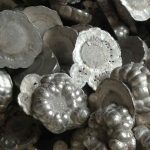As we all know, titanium has corrosion resistance characteristics, but in the actual production environment, titanium alloys will undergo different kinds of corrosion. Let's take a look at what is most "fearful" of invincible titanium alloys:

1. Crevice corrosion
In the crevices or defects of the metal components, the electrochemical cell is caused by the stagnation of the electrolyte, which causes local corrosion. In neutral and acid solutions, the probability of contact corrosion in the crevices of titanium alloys is much greater than that of alkaline solutions, and contact corrosion does not occur In the entire gap surface, it will eventually lead to partial perforation damage.
2. Pitting corrosion
In most salt solutions, titanium has no pitting corrosion. It mainly occurs in non-aqueous solutions and boiling high concentration chloride solutions. The halogen ions in the solution corrode the passivation film on the titanium surface and diffuse into the titanium to cause pitting corrosion. The pitting pore size is smaller than its depth, and some organic media are also pitting with titanium alloys in the halogen solution. Pitting corrosion of titanium alloys in halogen solutions usually occurs in high-concentration, high-temperature environments. In addition, pitting corrosion in sulfides and chlorides requires specific conditions is limited.
3. Hydrogen embrittlement
Hydrogen embrittlement, also known as hydrogen-induced cracking or hydrogen damage, is one of the causes of early damage and failure of titanium alloys. The passivation film on the surface of titanium and its alloys has high strength. The hydrogen embrittlement sensitivity increases with the increase in strength, so the hydrogen embrittlement sensitivity of the passivation film is very high.
4. Contact corrosion
The passive oxide film on the titanium surface promotes the electric displacement of the titanium to a positive potential, which improves the acid resistance and corrosion of the titanium material. Due to the higher potential on the surface of titanium alloy, it is bound to cause other metals in contact with it to form an electrochemical circuit and cause contact corrosion.
Titanium alloys are prone to contact corrosion in the following two types of media: the first type is tap water, salt solution, sea water, air, HNO3, acetic acid, etc. The stable electrode potential of Cd, Zn, and Al in this solution is more negative than that of Ti. The rate has increased by 6 to 60 times; the second type is H2SO4, HCl, etc. Titanium in these solutions may be in a passive state or in an activated state. The first type of solution corrosion is common in the actual contact corrosion process. Usually anodizing treatment [v] is used to form a modified layer on the surface of the substrate to prevent contact corrosion.
The main limitation of titanium and titanium alloys is their poor chemical reactivity with other materials at high temperatures. This property forces the titanium alloy to be different from the general traditional refining, melting and casting technology, and even often causes damage to the mold, making the price of the titanium alloy very expensive. Therefore, it was mostly used in aircraft structures, aircraft, and high-tech industries such as the petroleum and chemical industries. However, due to the development of space technology and the improvement of people's quality of life, titanium alloys are gradually used to make people's livelihood products to benefit people's lives.
Guest contributors are welcome at the Alloy Wiki.It is a weekly wiki and guide on alloy information and processing technology, while also about the vast array of opportunities that are present in manufacturing. Our team of writers consists of a Machining Material Supplier / Machinist / Tool and Die Maker, a Biomedical Engineer / Product Development Engineer, a Job Development Coordinator / Adjunct Professor, and a President and CEO of a manufacturing facility.
Link to this article:What is the most fear of titanium alloy
Reprint Statement: If there are no special instructions, all articles on this site are original. Please indicate the source for reprinting:Alloy Wiki,thanks!^^


